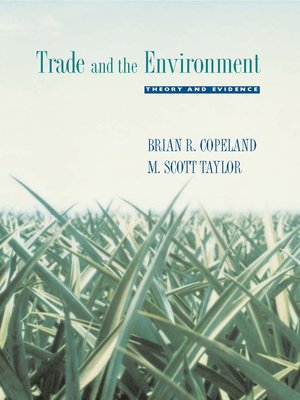Trade and the Environment
ebook ∣ Theory and Evidence · Princeton Series in International Economics
By Brian R. Copeland

Sign up to save your library
With an OverDrive account, you can save your favorite libraries for at-a-glance information about availability. Find out more about OverDrive accounts.
Find this title in Libby, the library reading app by OverDrive.



Search for a digital library with this title
Title found at these libraries:
| Library Name | Distance |
|---|---|
| Loading... |
Nowhere has the divide between advocates and critics of globalization been more striking than in debates over free trade and the environment. And yet the literature on the subject is high on rhetoric and low on results. This book is the first to systematically investigate the subject using both economic theory and empirical analysis. Brian Copeland and Scott Taylor establish a powerful theoretical framework for examining the impact of international trade on local pollution levels, and use it to offer a uniquely integrated treatment of the links between economic growth, liberalized trade, and the environment. The results will surprise many.
The authors set out the two leading theories linking international trade to environmental outcomes, develop the empirical implications, and examine their validity using data on measured sulfur dioxide concentrations from over 100 cities worldwide during the period from 1971 to 1986.
The empirical results are provocative. For an average country in the sample, free trade is good for the environment. There is little evidence that developing countries will specialize in pollution-intensive products with further trade. In fact, the results suggest just the opposite: free trade will shift pollution-intensive goods production from poor countries with lax regulation to rich countries with tight regulation, thereby lowering world pollution. The results also suggest that pollution declines amid economic growth fueled by economy-wide technological progress but rises when growth is fueled by capital accumulation alone.
Lucidly argued and authoritatively written, this book will provide students and researchers of international trade and environmental economics a more reliable way of thinking about this contentious issue, and the methodological tools with which to do so.







